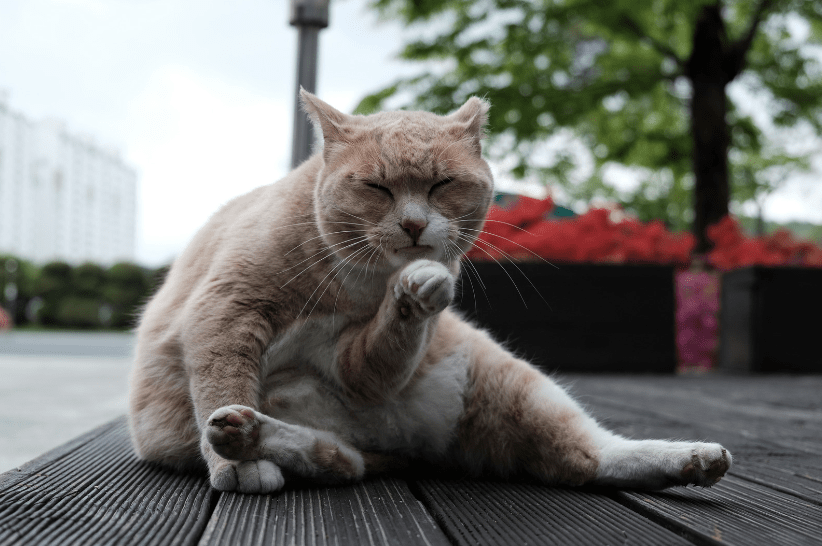
Blog
- Home
- Post: Can Cats Eat Popcorn: Debunking the Myth
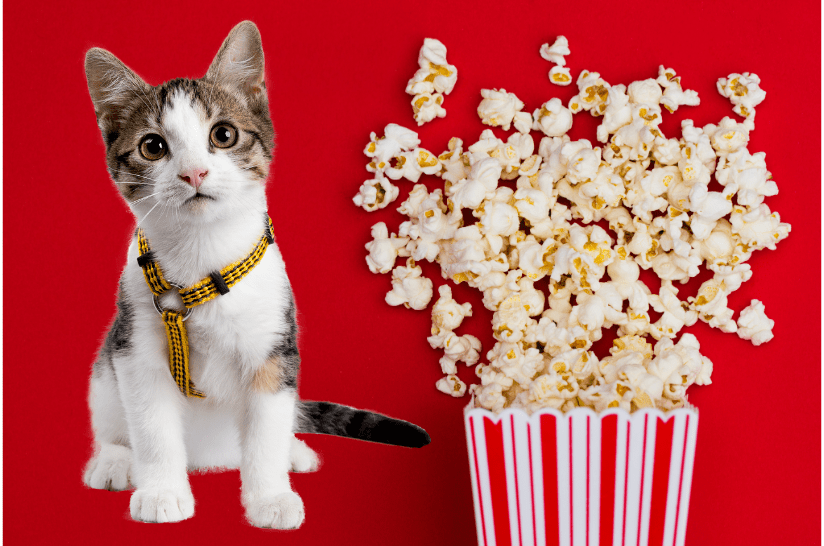
Can cats eat popcorn? Yes, Cats can eat popcorn, but it is important to avoid adding butter and salt, as they can be harmful to their health. Many cat owners wonder if it’s safe for their feline companions to indulge in the occasional popcorn treat.
While cats can technically eat popcorn, it’s crucial to be mindful of how it’s prepared and served. Plain, unbuttered, and unsalted popcorn is the safest option for cats, as additives like butter and salt can be harmful to their health.
This article explores whether cats can safely enjoy popcorn, the potential risks associated with certain popcorn toppings, and guidelines for feeding popcorn to cats. By following these recommendations, you can ensure that your feline friend can have a safe and enjoyable popcorn experience.
Freshly popped popcorn is not toxic to cats and can be safely consumed. However, it is essential to avoid adding butter, salt, or any flavorings, as they can cause health issues for cats. Stick to plain popcorn to ensure the safety of your feline friend.
Many pet owners often wonder whether it is safe for cats to eat popcorn. The truth is that popcorn itself is non-toxic to cats. However, it’s important to consider the various factors that can affect a cat’s health when it comes to enjoying this popular snack. While popcorn may not be inherently toxic, there are potential health issues that can arise when cats consume it. One of the main concerns is the risk of choking. Popcorn kernels can easily get lodged in a cat’s throat or digestive tract, leading to serious complications.
Butter, salt, and other flavorings can be harmful to cats in excessive amounts. These ingredients can lead to digestive problems, such as diarrhea or upset stomach. Additionally, the high salt content in flavored popcorn can be detrimental to a cat’s overall health, as it can lead to dehydration and kidney problems. When it comes to popcorn, it’s important to be aware of the ingredients that can be harmful to cats. Butter, for instance, is high in fat and can contribute to weight gain and obesity in feline companions.
Moreover, it contains lactose, which can cause digestive issues in cats since they are lactose intolerant. The salt content in popcorn is another major concern. Cats have a low tolerance for sodium, and excessive salt consumption can lead to dehydration and kidney problems. Additionally, certain flavorings, such as cheese or artificial seasonings, can contain ingredients that are toxic to cats. To ensure your cat’s health and well-being, it is best to avoid feeding them popcorn altogether or only offer plain, unsalted, and unbuttered popcorn in very small quantities as an occasional treat. If you’re looking for alternative snacks to offer your feline friend, there are plenty of healthy options that you can consider. These include:
Remember, it’s crucial to consult with your veterinarian before introducing any new food into your cat’s diet, especially if they have any underlying health conditions or dietary restrictions.
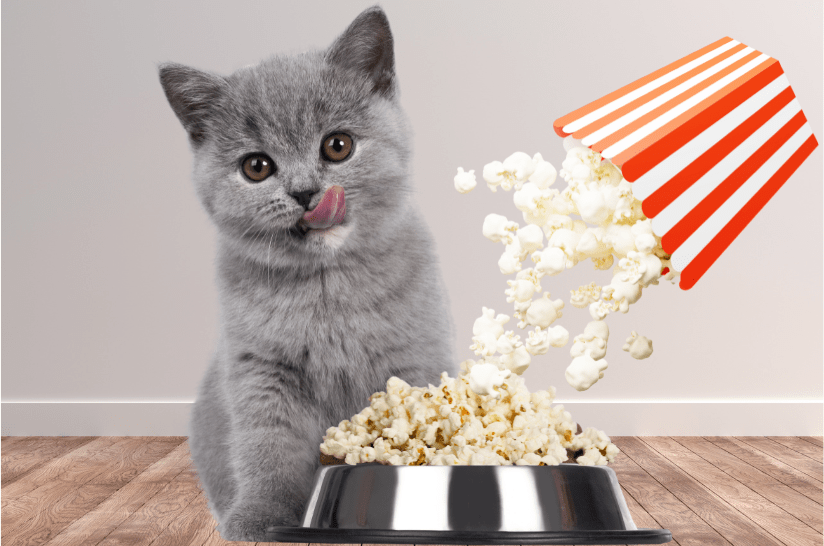
Many cat owners may question the safety of allowing their feline friends to indulge in popcorn. Plain popcorn, with no additional flavorings, isn’t toxic to cats. However, it’s crucial to consider the possible risks associated with feeding popcorn to your furry friend. In this section, we’re going to discuss how safe popcorn is for cats, the stance of the ASPCA on this issue, and the potential for choking and gastrointestinal complications. The ASPCA, or the American Society for the Prevention of Cruelty to Animals, has not explicitly labeled popcorn as a hazardous food for cats.
However, one should note that most popcorn we buy typically comes seasoned with butter, salt, cheese, or other flavorings that may not be fit for cats. While regular, air-popped popcorn is typically safe, we need to understand the potential risks tied to specific popcorn toppings. Cats could choke on popcorn, especially if it’s not properly popped or is large-sized. Cats have small, fragile throats, making them susceptible to choking when they eat bigger food pieces.
Moreover, seasonings added to popcorn, such as butter or salt, could potentially cause digestive discomfort or result in gastrointestinal complications in cats. So, although popcorn itself isn’t toxic to cats, it’s vital to exercise care and think about the potential risks. It’s always better to discuss with your vet before introducing popcorn or any human food to your cat’s diet. The vet can give you customized advice based on your cat’s specific requirements and health conditions.
Cats can eat popcorn, but there are potential health issues to consider. While popcorn itself is non-toxic to cats, butter, and salt commonly added to popcorn can be harmful. It can lead to choking hazards and other health-related problems.
Butter and salt are commonly added to popcorn to enhance its flavor. However, when it comes to cats, these additions can have adverse effects on their health. Butter is high in fat, which is not suitable for cats. A diet high in fat can lead to obesity and associated health issues such as diabetes and heart disease. Additionally, butter contains lactose, a sugar that many cats are intolerant to. Consuming butter can cause gastrointestinal upset, including diarrhea and vomiting. Salt, on the other hand, can be harmful to cats in excessive amounts. Cats have a low tolerance for sodium, and consuming too much salt can lead to dehydration and kidney problems. It is essential to remember that even small amounts of butter and salt can have cumulative effects on your cat’s well-being over time. It is always best to avoid giving your cat popcorn with butter and salt altogether.
Another aspect to consider is the role of corn in a cat’s diet. Corn is a common ingredient in many commercial cat foods due to its affordability and availability. However, cats are obligate carnivores, which means they derive most of their nutritional needs from animal protein. While corn can provide some carbohydrates, it lacks the essential amino acids that cats require for optimal health. Furthermore, some cats may have difficulty digesting corn, leading to gastrointestinal upset. Corn is also a common allergen for cats, causing skin irritations, itching, and gastrointestinal issues. To ensure your cat’s nutritional needs are met, it is recommended to feed them a diet primarily consisting of high-quality animal protein.
The concern is mainly about portion control when feeding cats popcorn. Popcorn is a high-calorie snack, especially with added butter and salt. If you feed your cat popcorn as a regular treat or let them have access to it in large amounts, it can cause weight gain and obesity. Obesity can result in numerous health issues in cats, such as joint problems, diabetes, and heart disease. It’s essential to watch your cat’s calorie intake and present them with a diet that fulfills their nutritional needs.
Instead of giving popcorn as a treat, you might want to think about healthier alternatives like cat-friendly treats or interactive toys to keep them mentally active. To sum it up, popcorn itself is not harmful to cats, but you must be aware of the potential health problems related to cats eating popcorn. The impact of butter and salt, the role of corn in a cat’s diet, and the obesity risks underline the importance of making well-informed decisions regarding your cat’s diet. Make sure to always talk to your vet before adding any new food to your cat’s diet to ensure their well-being.
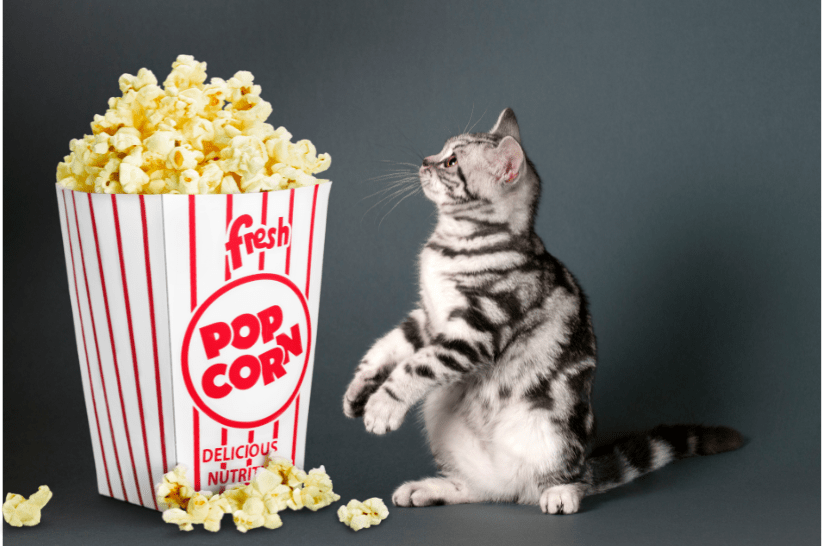
Obligate carnivores and cats have specific dietary needs that differ from humans. While we may find cheese a tasty addition to popcorn, it can harm our feline friends. Cheese contains lactose, to which most adult cats show intolerance. If you feed your cat popcorn laden with cheese, it may lead to digestive issues such as diarrhea, vomiting, and an upset stomach. You can commonly find sugar and artificial flavorings in packaged popcorn varieties.
These ingredients can have adverse effects on a cat’s health. Cats are not built to metabolize sugar efficiently, and excessive consumption can lead to weight gain, diabetes, and dental issues. Furthermore, artificial flavorings can contain chemicals that are toxic to cats. It is best to avoid feeding popcorn with sugar and artificial flavorings to your feline companion. Aside from cheese, sugar, and artificial flavorings, there are other additives commonly found in popcorn that can be harmful to cats. These include:
| Additive | Harmful Effects |
| Salt | Excessive salt consumption can lead to dehydration and electrolyte imbalances in cats. |
| Butter | Butter is high in fat and can contribute to weight gain and digestive issues in cats. |
| Garlic and Onion Powder | These ingredients are toxic to cats and can cause anemia and digestive problems if ingested in large amounts. |
It is crucial to be mindful of these harmful additives when sharing popcorn with your furry friend. Opting for plain, air-popped popcorn is the safest option if you decide to treat your cat to this popular snack.
While popcorn may not be suitable for cats due to the potential health risks associated with butter and salt, there are plenty of alternative snacks that can provide both nutrition and enjoyment for your feline friend. It’s important to choose healthy and safe options that won’t harm their digestive system.
When considering alternative snacks for cats, it’s essential to choose options that are both healthy and safe for their consumption. Here are some options that are widely considered to be suitable for cats:
If you’re unsure about which snacks are appropriate for your cat, you should always consult with a veterinarian. Veterinarians can provide specific guidance based on your cat’s age, weight, and any pre-existing health conditions. They can also recommend commercially available treats that are formulated to meet your cats’ dietary needs while providing variety in their snack options. Remember, you should introduce any new snacks gradually and monitor your cat’s response. If you notice any adverse reactions or changes in their behavior or digestion, you should discontinue the snack and consult with your veterinarian.
While cats may show interest in popcorn due to its flavors, it is important to remember that popcorn in itself is not toxic to cats. However, caution should be exercised when it comes to popcorn made with butter, salt, or other flavorings.
These additives can pose health risks and should be avoided. It is always best to prioritize a cat’s dietary needs by sticking to their regular, balanced cat food. Keep your furry friend safe and satisfied with cat-appropriate treats and snacks.

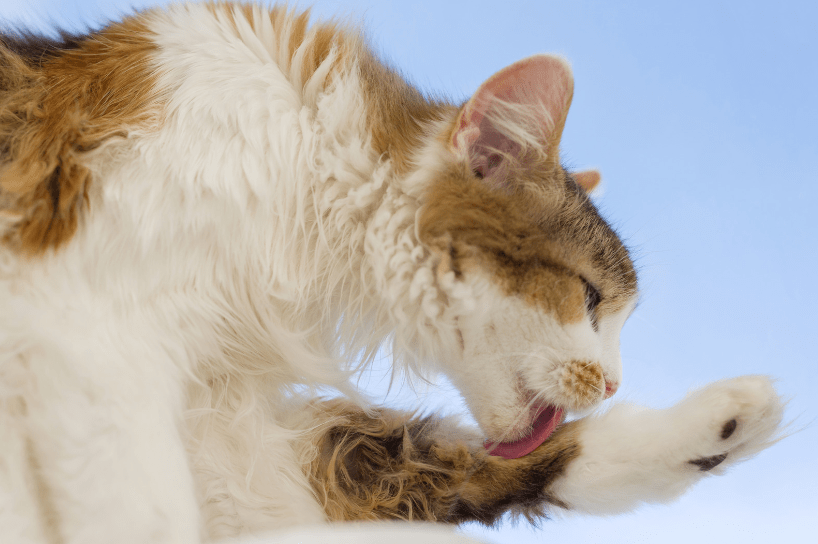
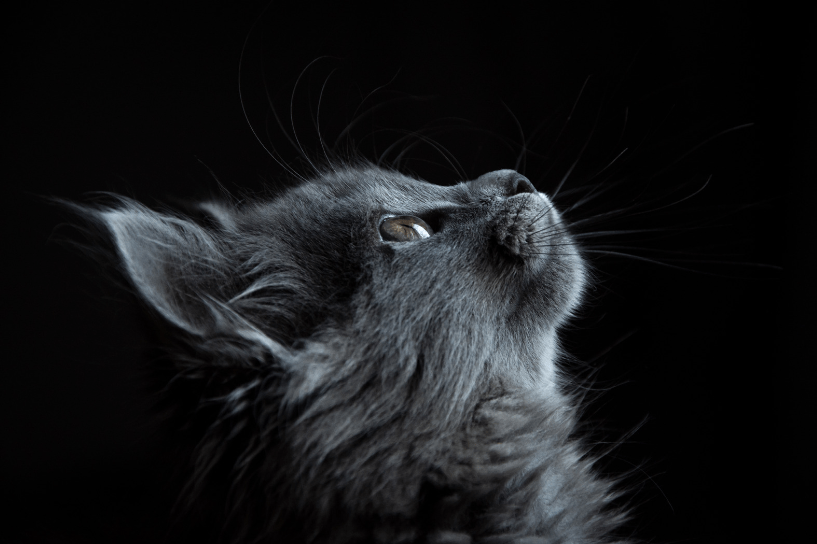
No, a cat cannot get pregnant by a…
Cat Sedative for a Grooming session. They help keep…
Why does my cat headbutt me? Headbutting is…
Cats groom each other to reinforce social bonds…
Cats contract the Feline Immunodeficiency Virus (FIV), also…


